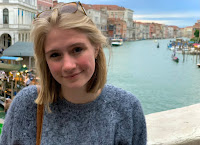For Purmalietis, the COVID-19has brought on many challenges, but also opportunities. With regard to the challenges, especially in relation to her reliance on lip reading, Purmalietis stated, “the hardest part of the pandemic has 100% been masking...my ability to communicate with people has just been ripped from my hands...it takes away a lot of my independence.” However, with clear masks becoming more accessible, and other University accommodations, school for her is starting to return to semi-normal despite ongoing challenges. Purmalietis was quick to note, however, the tremendous positive impact the pandemic had on improving access and inclusion when most everything suddenly switched to online. She commented,
...This pandemic, while it’s been horrible...having an online environment that is so widely accepted and accessible has been a good thing. Having Zoom [and] working from home has made the world so accessible to those with disabilities. For those with mobility issues, not having to go into work...or to rely on transportation [services] to get somewhere. Those with hearing loss, having live transcription in every meeting, and not having listening fatigue. I would hope we can maintain an option to have a widely accepted online environment, which will help increase accessibility at work after the pandemic. Getting us all so used to functioning in this online environment can be for the greater good.Purmalietis hopes that post-pandemic, we can maintain a widely accepted online environment, which will help continue to enhance access and inclusion at work, school, and beyond.
Looking to the future, Purmalietis sees herself potentially working with individuals with disabilities, hearing loss in particular, hopefully advocating for greater access to mental health services on their behalf. She counts herself as lucky in being able to connect with Dr. Oxenham and his lab, noting that he has been very accommodating and that the work is extremely interesting. She is currently deciding on graduate school, but first plans to take a gap year to allow herself time to confirm her interests before making her next move.
Composed by Flora Pollack, communications assistant.
